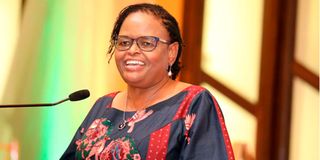Breaking glass ceilings: Reflections on women’s leadership in Kenya

Chief Justice and President of Supreme Court Martha Koome speaks during a thanksgiving luncheon hosted in her honour by the Ministry of Public Service and Gender at a Nairobi hotel on June 18, 2021.
What you need to know:
- Since 1952 when Maendeleo Ya Wanawake movement was registered, women’s journey to leadership has witnessed a checkered career.
- The country recently got its first female Chief Justice, Martha Koome, from a list that was dominated by males - the seat was previously seen as their preserve.
Women have made significant strides, in recent years, in their efforts to take leadership roles. In this last year before the general election, we should take a reflective moment on how to address leadership barriers women continue to face, and how to elevate more by drawing vital lessons from the milestones so far made.
The country recently got its first female Chief Justice, Martha Koome, from a list that was dominated by males - the seat was previously seen as their preserve. We also have the first woman serving as the Auditor General - Nancy Gathungu.
Kenyans, for the first time, elected three female governors in the 2017 election- the late Joyce Laboso in Bomet, Charity Ngilu of Kitui and Kirinyaga’s Ann Waiguru.
We also have 23.3 per cent of parliamentarians as women, a consistent improvement from the previous elections. The 2010 Constitution created women representative seats in the National Assembly to boost their numbers. Women have been appointed in cabinet, parastatals and departmental heads, heads of private sector boards and professional associations, among other sectors.
Since 1952 when Maendeleo Ya Wanawake movement was registered, women’s journey to leadership has witnessed a checkered career. This has awakened the national consciousness, creating an enabling environment to give them more opportunities.
Gender issues
Gender issues have been entrenched in legislation, policies, budgets, plans and institutional framework. We have seen the mainstreaming of gender in public and private life, establishment of affirmative action programs, availability of resources, and the setting up of gender quotas in various sectors geared towards women's empowerment.
Sadly though, the United Nations Development Programme (UNDP) Gender Development Index based on 2018 data, ranks Kenya 110th, a not so good score. Giving equal opportunities for gender parity across politics, economy and society would improve this ranking.
The gender pay gap persists and a recent study showed that the proportion of women in senior management positions remains dismal. Deliberate efforts to give mothers economic opportunities would also be a good starting point in improving the ranking.
Globally, three in every four hours of unpaid work is done by women. Pressure on this is expected to grow as the world's population ages since it is women who do most of the unpaid work catering for the elderly and vulnerable family members.
Economic empowerment
Our social welfare policies and programmes must take cognizance of this by making it mandatory to pay women and men equally. It is crucial to improve their recruitment in sectors where they are under-represented, including the maritime and military sectors.
Gender equality is a fundamental human rights and an economic empowerment issue, and we should all work harder to achieve it.
Political parties must also address barriers that prevent more women from participating in political processes. This can be done by having more women in party leadership positions and creating a conducive environment that minimises intimidation and influence of money as a vehicle to elective positions.
It is unfortunate that unlike men, women seeking leadership positions in most cases lack networks. They are also exposed to greater danger during campaigns and need support for their physical security.
We have come a long way as a nation and this is a good time to take stock of the progress women have made in leadership and consider how we can build on it going forward.
We must make every effort to build a country where women flourish in all areas of political, social, and economic life-including leadership.
Mr Obonyo is a Public Policy Analyst.





